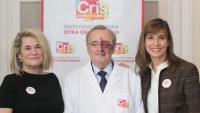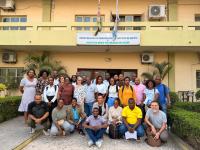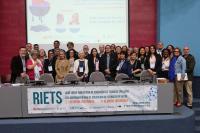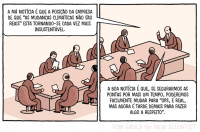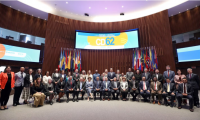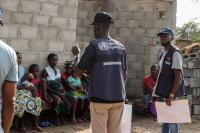You are here
News
-
02/04/2026 - A study conducted by Spanish scientists has developed a drug combination therapy capable of completely eliminating pancreatic tumors in tests with mice. Beyond achieving total tumor regression, the strategy also prevented the development of treatment resistance—one of the major challenges in current oncology.
-
01/05/2026 - The brain goes through five distinct phases in life, with key turning points at ages nine, 32, 66 and 83, scientists have revealed. Around 4,000 people up to the age of 90 had scans to reveal the connections between their brain cells. Researchers at the University of Cambridge showed that the brain stays in the adolescent phase until our early thirties when we "peak". They say the results could help us understand why the risk of mental health disorders and dementia varies through life.
-
12/30/2025 - Special Cohort brings together workers from Mozambique, Angola, Cabo Verde, and São Tomé and Príncipe, with in-person classes and synchronous remote activities
-
12/05/2025 - On World AIDS Day, the World Health Organization (WHO) calls on governments and partners to rapidly expand access to new WHO-approved tools including lenacapavir (LEN) to drive down infections and counter disruption to essential health services caused by cuts to foreign aid.
-
11/10/2025 - Held on October 9 and 10, 2025, the 2nd Ordinary Meeting of the Ibero-American Network of Health Technicians Education (RIETS) was attended in Rio de Janeiro by representatives of institutions from 11 of the 22 countries in the community: Argentina, Bolivia, Brazil, Chile, Colombia, Costa Rica, El Salvador, Paraguay, Peru, Portugal, and Uruguay. In addition, several other institutional representatives followed the meeting via Zoom, with the aim of evaluating the network's performance and establishing its 2026-2028 Work Plan.
-
10/22/2025 - In 2021, the World Health Organization (WHO) stated that climate change is responsible for about one-quarter of all deaths worldwide — approximately 13 million each year. This highlights the urgency of addressing the issue. In the year of the 30th United Nations Climate Change Conference (Conference of the Parties – COP30), to be held in November in Brazil, it is only fitting to discuss the topic in connection with the training of health technicians. To this end, RIETS invited two experts in the field — researchers and professors Renata Gracie, from the Institute of Communication and Scientific and Technological Information in Health (ICICT/Fiocruz), and Alexandre Pessoa, from the Joaquim Venâncio Polytechnic School of Health (EPSJV/Fiocruz) — to participate in the seminar “Climate Emergencies and their Impacts on Global Health, National Health Systems, and the Training of Technicians,” the opening event of the Meeting.
-
10/06/2025 - The 62nd Directing Council of the Pan American Health Organization (PAHO) concluded today, setting a bold agenda to address pressing health challenges across the Americas through the approval of the PAHO Strategic Plan 2026–2031 and key resolutions aimed at expanding access to high-cost high price health technologies, and preventing and controlling noncommunicable diseases (NCDs).
-
09/25/2025 - As part of the First National Public Health Congress, “Health in All Policies,” organized by the Faculty of Medicine of the National University of Asunción with the support of the Pan American Health Organization (PAHO), Dr. Rômulo Paes de Sousa, researcher and professor, and Marcos Boulos, a renowned Brazilian infectious disease specialist, who gave keynote speeches on Health in All Policies and the One Health concept, respectively.
-
09/23/2025 - Following the declaration of the Ebola virus disease outbreak in the Democratic Republic of the Congo, Angola is intensifying surveillance, prevention, and preparedness measures against the disease, particularly in Lunda Norte province, which borders the DRC.
-
09/22/2025 - With the aim of building new partnerships to strengthen national health systems, one of the main legacies of the 1st Conference of the National Public Health Institutes (NPHIs) of the Brics is the creation of a permanent Network of the bloc’s NPHIs. The representatives of the countries reached a consensus in pursuit of solidarity and the sharing of experiences.

